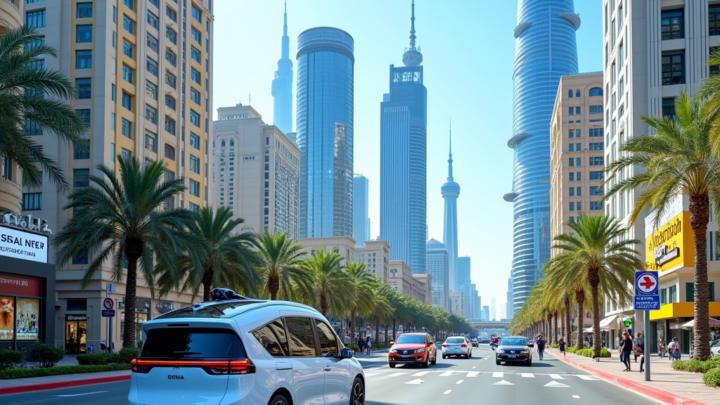Dubai’s Smart City initiatives represent a transformative approach to urban planning and governance, aligning with its vision for sustainable economic growth. These initiatives leverage technology to enhance the quality of life, boost efficiency, and ultimately shape current and future business trends in the region. The integration of advanced technologies, big data, and IoT (Internet of Things) plays a crucial role in making the city a hub for innovation. As such, businesses are being compelled to adapt to these changes, fostering a competitive landscape that emphasizes tech-driven solutions and enhanced customer experiences. This article delves into the various aspects of Dubai’s Smart City initiatives and their impact on business trends.
The Pillars of Dubai’s Smart City Strategy

Dubai’s Smart City strategy is built upon interconnected pillars that aim to improve the lives of residents and visitors alike. Here are the main pillars:
- Smart Economy: A focus on innovation, entrepreneurship, and technology-driven industries.
- Smart Mobility: Enhancements in transportation infrastructure and systems for easier connectivity.
- Smart Environment: Sustainability initiatives aimed at reducing the city’s carbon footprint.
- Smart Living: Enhancing the quality of life through improved health services, education, and community engagement.
- Smart Governance: Efficient public services and stakeholder engagement powered by data and transparency.
These pillars not only guide the city’s operational methods but also attract businesses that want to tap into state-of-the-art facilities and services. When organizations align with these core principles, they find opportunities to innovate and thrive.
Technological Advancements Transforming Businesses

With a robust infrastructure built on cutting-edge technologies, Dubai is witnessing significant changes in how businesses operate. Key technological advancements include:
- IoT Integration: Businesses are utilizing IoT devices to streamline operations, monitor performance in real time, and improve decision-making.
- Blockchain Technology: Enhanced security and transparency in transactions promote trust and efficiency in business dealings.
- AI & Machine Learning: These technologies enable personalized customer experiences and can significantly boost marketing effectiveness.
- Smart Transportation Solutions: Autonomous vehicles and smart logistics are redefining supply chain management.
These advancements encourage companies to rethink their operational strategies and often result in decreased costs, improved customer satisfaction, and greater market reach. This transition is particularly attractive for startups looking to enter Dubai’s competitive market.
Dubai’s Smart City initiatives are a breeding ground for innovation and entrepreneurship, particularly for startups and small to medium-sized enterprises (SMEs). The city provides various advantages for budding businesses, including:
- Access to Funding: Various government initiatives and private investors are keen on funding tech-driven startups.
- Incubator Programs: Numerous incubators and accelerators offer support to new businesses, providing mentorship, resources, and networking opportunities.
- Increased Connectivity: Enhanced transportation systems and digital infrastructure make it easier for businesses to connect with clients, suppliers, and partners.
- Collaborative Ecosystem: The burgeoning community of like-minded innovators promotes collaboration and idea exchange.
As a result, SMEs can take advantage of these Smart City initiatives to scale operations and capture new markets more efficiently.
Challenges and Considerations for Businesses
While the Smart City initiatives offer many benefits, businesses must also navigate certain challenges. These may include:
- Adoption Costs: Initial investments in technologies and infrastructure can be significant, especially for smaller enterprises.
- Skills Gap: The rapid pace of technological change can create a skills gap, necessitating additional training and resources.
- Regulatory Compliance: Adhering to new regulations related to data usage, privacy, and security can be daunting.
- Competition: The influx of tech-centric startups increases competition, challenging traditional businesses to innovate or risk being left behind.
Despite these challenges, the long-term benefits of aligning with the Smart City vision can outweigh the initial hurdles, making it worthwhile for businesses to invest in new technologies and processes.
Conclusion
Dubai’s Smart City initiatives are undeniably reshaping business trends, encouraging innovation and significantly enhancing operational efficiencies. By integrating advanced technologies into urban life, the city is positioning itself as a global business hub, particularly for startups and SMEs eager to leverage these resources. While challenges exist, the potential for growth and success in this rapidly evolving marketplace is immense. As businesses continue to adapt to these initiatives, the landscape of Dubai’s economy will likely undergo remarkable transformations, further solidifying its reputation as a leader in the smart city movement.
Frequently Asked Questions
1. What is a Smart City initiative?
A Smart City initiative refers to urban development projects that leverage technology and data to enhance the quality of life, improve operational efficiency, and promote sustainability.
2. How do Smart City initiatives benefit businesses in Dubai?
These initiatives offer businesses enhanced connectivity, access to advanced technologies, funding opportunities, and a collaborative ecosystem for innovation, helping them operate more efficiently and competitively.
3. Are there specific industries benefiting the most from Dubai’s Smart City initiatives?
Industries related to technology, logistics, transportation, healthcare, and tourism are particularly benefiting due to increased operational efficiencies and innovation opportunities.
4. What challenges might businesses face in adapting to Smart City initiatives?
Businesses may face challenges such as high adoption costs, a skills gap, regulatory compliance issues, and increased competition.
5. How can startups thrive in Dubai’s Smart City landscape?
Startups can thrive by leveraging available funding, participating in incubator programs, embracing innovative technologies, and engaging with the collaborative entrepreneur community.



